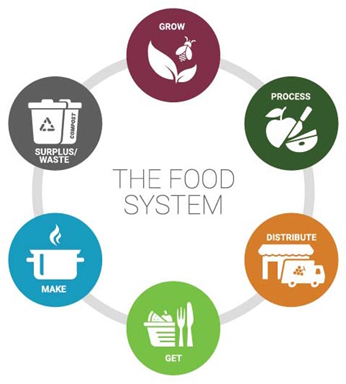What is a food system?
A ‘food system’ includes the people, infrastructure, and processes involved in the path that food travels from field to fork, such as growing, harvesting, processing, transporting, marketing, accessing, preparing, consuming, and disposing of food.
Each part of the food system faces unique set of issues, from production issues (farmland preservation, water access, household & community gardens), to processing issues (adequate facilities), to distribution issues (transportation, warehousing), to access issues (inner city grocery stores, co-ops, school breakfasts & lunches, farmers markets), to use issues (food safety and handling, restaurants, cooking skills), to food recycling (gleaning, food banks, soup kitchens) to waste stream issues (composting, inventory management).

Source: Healthy Food Policy Project
These sectors are interconnected, making food systems extremely complex. Groups working with complex issues must adapt to changes, deal with conflicts, and constantly learn new things. Systems thinking acknowledges that solutions require collaborative engagement from more than one sector or organization; considers long term, short term, and unintended consequences; targets the root causes of an issue; identifies leverage points that could lead to change; and monitors how things change over time and adapts its processes accordingly.
Groups can address food issues by acting with a common ‘food system vision’ or set of goals in mind. This involves careful analysis of food system sector relationships and food systems thinking, and food policy councils are formed to do this work.
Different interests are brought together as food policy councils discuss system issues, research and analyze these issues using a systems thinking approach, and proposes policy changes and / or programming related to the food system. By including a broad representation of members across food system sectors, food policy councils can provide a unique and effective lens for food systems thinking, networking, education, and policy advice.
The Winnipeg Food Council does not make policy, but is rather a group of volunteer consulting experts who advise policy makers and respond to recommendations made by Mayor and Council.
